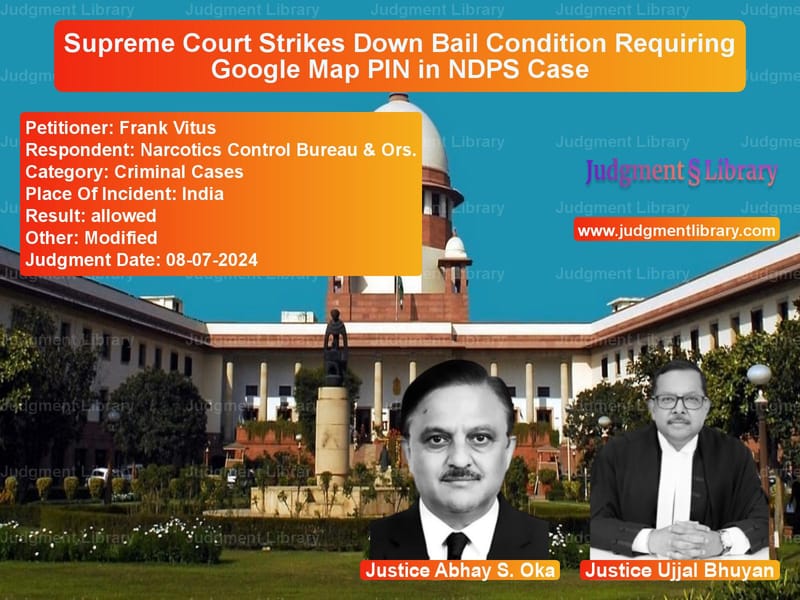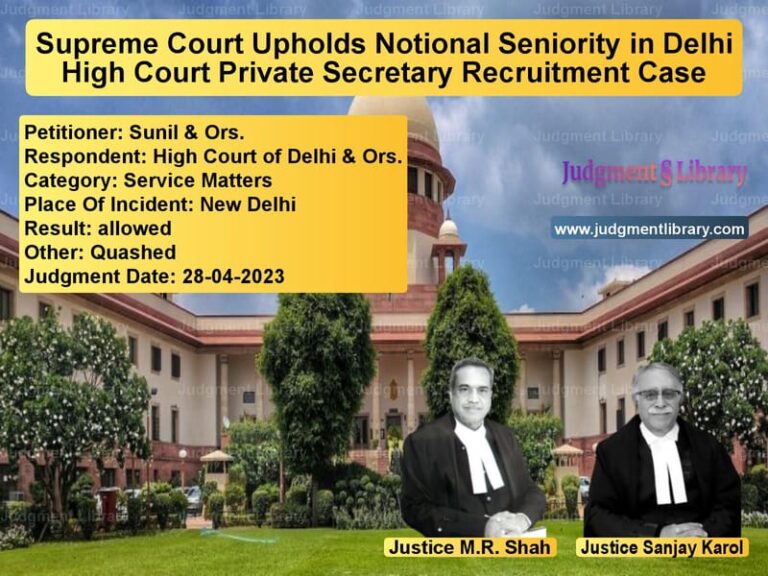Supreme Court Strikes Down Bail Condition Requiring Google Map PIN in NDPS Case
The case of Frank Vitus vs. Narcotics Control Bureau & Ors. is a significant ruling by the Supreme Court regarding the conditions imposed on bail, particularly for foreign nationals accused under the Narcotic Drugs and Psychotropic Substances Act, 1985 (NDPS Act). The Court addressed whether a condition requiring an accused to drop a Google Maps PIN to track their movements violated the right to privacy under Article 21 of the Constitution.
Background of the Case
The appellant, Frank Vitus, was arrested on May 21, 2014, for offences punishable under Sections 8, 22, 23, and 29 of the NDPS Act. He was accused of being involved in drug-related offences and had been in custody for an extended period. The Special Judge granted him bail on May 31, 2022, subject to stringent conditions, including:
- Furnishing a bail bond of Rs.1,00,000/- with two sureties.
- A certificate of assurance from the Nigerian High Commission stating that he would not leave India and would appear before the court as required.
- Dropping a PIN on Google Maps to ensure his location was constantly available to the Investigating Officer.
Aggrieved by these conditions, the appellant approached the Supreme Court, challenging their legality.
Petitioner’s Arguments
The appellant, represented by senior counsel, argued the following:
- The condition requiring a certificate from the Nigerian High Commission was impractical, as no foreign embassy could provide such assurances.
- Forcing an accused to drop a Google Maps PIN infringes on his right to privacy and is an arbitrary form of surveillance.
- The bail conditions imposed by the lower courts were excessively onerous, effectively making bail meaningless.
- In the case of Tofan Singh v. State of Tamil Nadu, the Supreme Court had held that confessional statements recorded under Section 67 of the NDPS Act were inadmissible, and the appellant’s case was based primarily on such statements.
Respondent’s Arguments
The Narcotics Control Bureau (NCB) opposed the appeal, contending:
- The conditions were imposed to ensure that the accused did not flee from justice.
- Foreign nationals accused of drug offences often abscond, necessitating strict bail conditions.
- The Google Maps PIN requirement was merely a tool to ensure compliance with bail conditions.
Supreme Court’s Observations
The Supreme Court examined the legal and constitutional implications of the bail conditions and made the following observations:
“The object of bail conditions cannot be to keep the accused under constant surveillance. The use of technology to track every movement of an accused violates his fundamental right to privacy under Article 21.”
The Court also emphasized that:
- The requirement for an embassy certificate was introduced as a one-time measure in the Supreme Court Legal Aid Committee vs. Union of India case and was not meant to be applied in every case.
- The bail conditions must not be so harsh that they defeat the very purpose of granting bail.
- While the accused must ensure court attendance, real-time location tracking is disproportionate and unnecessary.
Final Verdict
The Supreme Court ruled:
“The conditions of obtaining a certificate from the Nigerian High Commission and dropping a Google Maps PIN are set aside. The accused shall remain on bail on furnishing a bail bond of Rs.1,00,000/- with two sureties and shall report to the local police station at regular intervals.”
The Court’s decision struck down the controversial bail conditions and reinforced the principle that an accused’s fundamental rights must be protected even while facing criminal charges.
Implications of the Judgment
This ruling sets a precedent on bail conditions, particularly in cases involving foreign nationals:
- Protection of Privacy: Bail conditions should not violate an individual’s right to privacy.
- Restrictions on Embassy Certificates: Courts cannot universally mandate embassy assurances for foreign accused.
- Proportionality in Bail Conditions: Any restrictions imposed must align with the principle of proportionality.
Conclusion
The Supreme Court’s decision in this case ensures that bail conditions remain fair and reasonable. While it is essential to prevent an accused from fleeing, this objective must be balanced against fundamental rights, ensuring that justice is not compromised.
Petitioner Name: Frank Vitus.Respondent Name: Narcotics Control Bureau & Ors..Judgment By: Justice Abhay S. Oka, Justice Ujjal Bhuyan.Place Of Incident: India.Judgment Date: 08-07-2024.
Don’t miss out on the full details! Download the complete judgment in PDF format below and gain valuable insights instantly!
Download Judgment: frank-vitus-vs-narcotics-control-bu-supreme-court-of-india-judgment-dated-08-07-2024.pdf
Directly Download Judgment: Directly download this Judgment
See all petitions in Bail and Anticipatory Bail
See all petitions in Drug Possession Cases
See all petitions in Custodial Deaths and Police Misconduct
See all petitions in Fundamental Rights
See all petitions in Legal Malpractice
See all petitions in Judgment by Abhay S. Oka
See all petitions in Judgment by Ujjal Bhuyan
See all petitions in allowed
See all petitions in Modified
See all petitions in supreme court of India judgments July 2024
See all petitions in 2024 judgments
See all posts in Criminal Cases Category
See all allowed petitions in Criminal Cases Category
See all Dismissed petitions in Criminal Cases Category
See all partially allowed petitions in Criminal Cases Category







